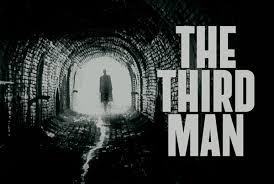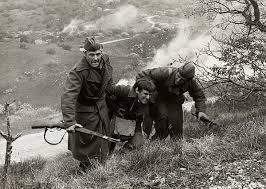Kramberger with Monkey, Chapters II and III
Chapter One
Monkey Business
Where the hell was the monkey when Kramberger was assassinated? There’s the story I really wanted. But nobody knew. Nobody. The man was famous for traveling the country with his jalopy and his books and giving speeches with a monkey on his shoulder. And when he was assassinated the monkey was nowhere to be seen. When Kramberger was killed by a small bore bullet from a distance too great to make sense given all the details of the story, hence we conclude conspiracy, the monkey was absent. What, did he call in sick that day? Conspiracies are one thing, but it’s difficult to approach one from the point of view that a monkey was somehow involved, that maybe the victim’s own monkey was complicit, that at the very least the monkey ‘let it happen’. And so, not given to allowing a preponderance of the absurd in such investigations—let’s say a Latin American ruler spouting off against American interests is handed a tape recorder just before boarding a flight that subsequently blows up, killing all on board: we, not being an actual court of law and thus having less stringent burdens of proof and therefore more effectively arrive at the truth, conclude he was handed a bomb–in fact basing much of our conclusions on the refusal to give the absurd more than its due, we are forced to accept a degree of chance, or, if you like, coincidence. And that puts us flat on the continuum that leads all the way to the official version that a drunken hunter got off a freak shot that just happened to puncture Kramberger’s chest with the precision of a sniper shot rather than zinging off a railing somewhere or chipping a wooden roof slat. It therefore seems incumbent upon me to investigate the circumstances of the missing monkey. Maybe I will only eliminate a possibility; maybe the monkey was up in Graz undergoing dialysis.
Chapter Two
The Third Man

Well, that guy was quickly eliminated, which puts us square in the third person, where we hope for a degree of safety in numbers. He may not have been of much use anyway. His name was Todd Fullmer, and he was a tabloid reporter for an American weekly, called, with admirable something or other, Political Sleeze. He was their assassination correspondent, perhaps the only one of his kind anywhere in the world. He rented an Opel, perhaps the most popular rental car of our time, drove from Ljubljana to Maribor, and then going about 90 kph on a straightaway near Negova the steering went out abruptly and the straightaway curved and he drove, with his learner’s permit—no, with his empty notebook—in his briefcase, head on into a large tree. He was killed instantly, or, if not, after great suffering.
But what about that empty notebook? This was to be his second visit to Kramberger’s birth and then death place(s). Why would he have brought an empty notebook? He had interviewed dozens of people on his first visit, always with a notebook open, always jotting things down, even though he always had a tape recorder going, a tape recorder he apparently didn’t think to bring along this time, for no tape recorder was found at the scene of the accident. Remarkable negligence in an experienced reporter, wouldn’t you say?
Experts on such matters suggest that though it is easy to doctor, so to speak, an automobile so that it might malfunction at a high speed, there are far better ways to ensure that an accident will occur to deadly effect. What if, say, the steering went out as Fullmer was coming to a stop sign? He might veer off the road into a field and come to a gentle, rolling stop, might he not? One answer to that is that, well, if the accident doesn’t kill him, maybe it could serve as a warning. With such ambiguity of intent it is difficult to call his death an assassination. Then again, it is certainly not fair to call it a warning gone awry. The perpetrator(s) had to have known that his death was a good enough possibility.
Whatever. Todd Fullmer died before he could finish his investigation into the circumstances of Ivan Kramberger’s death, before he could publish his article, which would have been quite a coup in that it would have lumped Slovenia in amongst those countries that solved political inconveniences with assassination, especially that small group of European countries that emerged as new nations or makeovers of nations after, to accept one dividing line, the fall or knocking down of the Berlin Wall.
The emphasis here should be on the cleanliness of Slovenia, which declared independence, had a clean little war, turned out to be a clean little country, about fifty percent forested, with clean highways, and clean living, striving folk, who were not maniacs like their southern neighbors and ex-partners, nor fascists like their northern neighbors. Slovenia didn’t even have a ‘Gypsy problem’.
Todd Fullmer’s death kept Slovenia clean.
Chapter Three
Literature and Conspiracy in Slovenia
If the terrain of modern literature were three dimensional, we would drive around it even if it took an extra day. The landscape is littered with above-average unpublished American writers and lesser American writers who are published; these are the side of the road equivalent of plastic bags. There are, of course the occasional great figures, like Antonio Lobo Antunes, standing alone like a cypress; but the wind carries these bags all over the place and the cypress gets spoiled with all these anti-ornaments. We could go on and on with this metaphor—maybe Beckett would be a horny toad blending into the desert and Joyce would be a fantastic, giant pink buttocks, etc.—but I’ll stop at the sinkholes, the virtually unknown great writers, who are not only invisible from the road, but even when you are standing at the very lip of their weedy descent. The bones of Vitomil Zupan are buried in a sinkhole somewhere. Even though his Minuet for Guitar is one of the greatest war novels ever written he is unknown outside of Slovenia. As tragedies go, this kind is very difficult to gauge. Recognition lacks protein and has no affect whatsoever on longevity vis a vis actual life span. Vitomil himself understood this; here is a quotation from Minuet for Guitar: ‘What did Leibniz gain in his last hour from his innocent faith in the orderliness of this world? At any rate my cat is happier than him.’ Perhaps later we will have the opportunity to discuss Zupan’s theory of revolutions. For now it is enough to say that his extraordinary novel’s action comes to an end with the accidental death of the narrator’s comrade in arms, Anton. Celebrating the end of the war, a partisan pounded his Italian automatic on the floor and its magazine spent itself, sending a volley up through the ceiling to where Anton stood waiting to receive his absurd death.
No study of the modern Slovene novel is complete without some mention of Ciril Kosmać’s A Day in Spring in which the somber tale of a Czech soldier in the same war in the same general region is killed almost identically, though by an English Sten gun, which Kosmać tells us was notorious for going off accidentally. 30 bullets to the head, end of novel.
What are we to make of this coincidence? Maybe nothing. Or maybe we will end this novel with an accidental death by gunfire. But as the prevailing topic is assassination it is incumbent upon us to consider that aspect of the conspiracy known as the cover story. Now in a small, highly literate country such as Slovenia, where the two greatest novels of recent history end with accidental death by gunfire—and neither novel is surreal or absurdist—one cannot help but think that a darn good anodyne for the body politic that loses a politician to assassination would be the cover story best abbreviated ‘Woops’.










